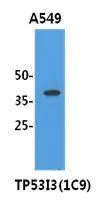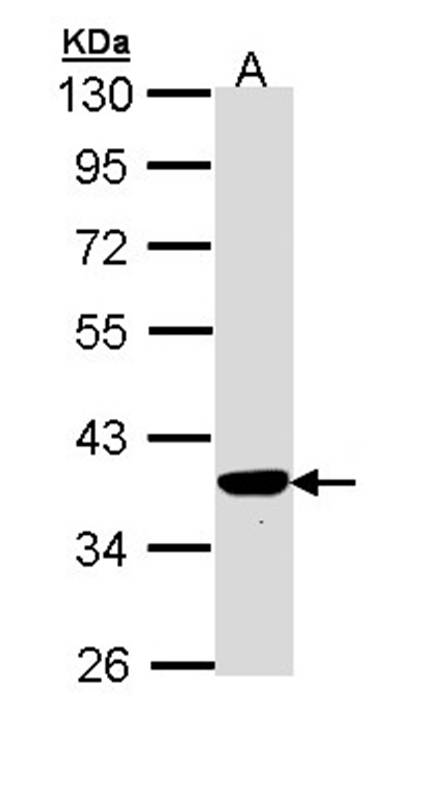
WB analysis of A549 lysate (40ug) using TP53I3 antibody at a dilution of 1:3,000.
PIG3 antibody [AT1C9]
GTX53794
ApplicationsWestern Blot, ELISA
Product group Antibodies
ReactivityHuman
TargetTP53I3
Overview
- SupplierGeneTex
- Product NamePIG3 antibody [AT1C9]
- Delivery Days Customer9
- Application Supplier NoteThe antibody has been tested by ELISA, Western blot analysis to assure specificity and reactivity. Since application varies, however, each investigation should be titrated by the reagent to obtain optimal results. Recommended dilution range for Western blot analysis is 1:3,000.
- ApplicationsWestern Blot, ELISA
- CertificationResearch Use Only
- ClonalityMonoclonal
- Clone IDAT1C9
- Concentration1 mg/ml
- ConjugateUnconjugated
- Gene ID9540
- Target nameTP53I3
- Target descriptiontumor protein p53 inducible protein 3
- Target synonymsPIG3, quinone oxidoreductase PIG3, NADPH:quinone reductase PIG3, p53-induced gene 3 protein, quinone oxidoreductase homolog
- HostMouse
- IsotypeIgG2a
- Protein IDQ53FA7
- Protein NameQuinone oxidoreductase PIG3
- Scientific DescriptionThe protein encoded by this gene is similar to oxidoreductases, which are enzymes involved in cellular responses to oxidative stresses and irradiation. This gene is induced by the tumor suppressor p53 and is thought to be involved in p53-mediated cell death. It contains a p53 consensus binding site in its promoter region and a downstream pentanucleotide microsatellite sequence. P53 has been shown to transcriptionally activate this gene by interacting with the downstream pentanucleotide microsatellite sequence. The microsatellite is polymorphic, with a varying number of pentanucleotide repeats directly correlated with the extent of transcriptional activation by p53. It has been suggested that the microsatellite polymorphism may be associated with differential susceptibility to cancer. Alternatively spliced transcript variants encoding different isoforms have been found for this gene. [provided by RefSeq, May 2011]
- ReactivityHuman
- Storage Instruction-20°C or -80°C,2°C to 8°C
- UNSPSC12352203







